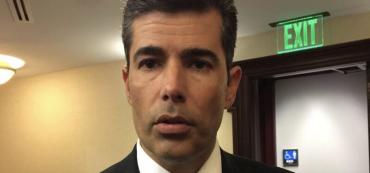
Florida’s nursing another election-related black eye, after Broward and Palm Beach county election officials were unable to meet deadlines to submit election results to the state.
The missed deadlines were among a number of problems in the heavily Democratic regions, exposed by slim margins in statewide races for governor, U.S. Senate and agriculture commissioner.
Each time Florida has suffered an election embarrassment, including after the protracted 2000 presidential recount, state lawmakers have tweaked statutes in the hopes of avoiding another spectacle.
This time around, Senate President Bill Galvano, a Bradenton Republican who took the Senate gavel Tuesday, said he expects the Legislature to review various aspects of the elections process, from the handling of vote-by-mail ballots to deadlines.
But new House Speaker José Oliva, R-Miami Lakes, isn’t certain Florida election laws need a tweak.
“It’s an issue for us, but not because there are other laws that we may need to put in place, but because there were laws in place that were violated. That’s the biggest issue. The biggest takeaway from Palm Beach and Broward is that there were laws in place, but either new rule-making was introduced by the supervisor of elections that law does not allow for, or laws and deadlines were just passed up, and even court orders were ignored,” Oliva told reporters after becoming speaker Tuesday.
Oliva’s comments echoed the GOP mantra expressed by leaders including President Donald Trump and Gov. Rick Scott, who defeated Democratic U.S. Sen. Bill Nelson in a bitter battle that resulted in a manual recount. Trump and Scott accused the elections chiefs in the two South Florida counties of fraud and incompetence. In more than a dozen election-related lawsuits, however, no judge found evidence of election-related fraud.
While the newly anointed House speaker may not believe the state’s elections laws need to be fine-tuned, Democrats have made the issue one of their top priorities going into the legislative session that begins in March.
House Minority Leader Kionne McGhee, D-Miami, said his caucus will back proposals that include automatic voter registration, reforms to voter-signature verification, extensions of recount deadlines and uniform ballot designs.
“Floridians deserve a democracy where voters decide elections, not broken machines or arbitrary deadlines,” McGhee said in a statement Tuesday. “Regardless of political affiliation, every eligible voter must be able to vote, and their vote must be counted. These are fundamental principles to our democracy that have gone disregarded for far too long. When statewide races are determined by razor-thin margins, this principle is paramount.”
TRUMP TRADE DEAL NETS GOP OPPONENTS
Trump’s signature revision of a trade deal with Mexico and Canada, which awaits congressional approval, is facing opposition on a few fronts from Florida.
Three members of the Sunshine State’s congressional delegation --- Matt Gaetz, Ted Yoho and Daniel Webster --- are among a group of about 40 House Republicans who want Trump to remove a workplace provision about anti-LGBT discrimination from the rebranded United States-Mexico-Canada Agreement, formerly known as the North American Free Trade Agreement.
“A trade agreement is no place for the adoption of social policy,” the letter released last week said.
One chapter of the deal requires all three countries to implement policies that protect workers against discrimination, including “sexual orientation” and “gender identity.”
“It is especially inappropriate and insulting to our sovereignty to needlessly submit to social policies which the United States Congress has so far explicitly refused to accept,” the Republicans wrote.
The letter, which asks Trump to get Mexico and Canada to agree to remove the language, contends the trade proposal would set a “dangerous precedent” for future judicial cases and effectively codify executive orders issued by former President Barack Obama.
Meanwhile, farmers and ranchers in Florida and Georgia continue to voice criticism that the new deal, like the current 24-year-old NAFTA that Trump campaigned against, doesn’t protect fruit and vegetable growers from lower-priced blueberries, bell peppers, strawberries and tomatoes from Mexico.
Florida Agriculture Commissioner Adam Putnam, whose term ends in January, blasted the trade deal last week during an appearance before the U.S. International Trade Commission, which is expected to provide an assessment of the agreement before Congress votes on the proposal.
“Since the turn of the millennium, imports of many agricultural products from Mexico have increased dramatically, proving particularly injurious to Florida agriculture’s specialty crop sector,” Putnam said.
“Unfairly subsidized” commodities are coming into the U.S. market, resulting in “disproportionate economic injury to Florida’s specialty crop industry,” Putnam, in Washington, D.C., said, adding that the president’s plan won’t alleviate the problem.
“Unfortunately, the trade environment created under NAFTA, and the trade environment that will be created under USMCA (the new proposal) is anything but a fair and level playing field for Florida’s producers,” Putnam said.
TWEET OF THE WEEK: "Congratulations to Andrew Gillum on having run a really tough and competitive race for Governor of the Great State of Florida. He will be a strong Democrat warrior long into the future - a force to reckon with!" --- President Donald Trump (@realdonaldtrump), after the Tallahassee mayor conceded the governor's race to Republican Ron DeSantis.


